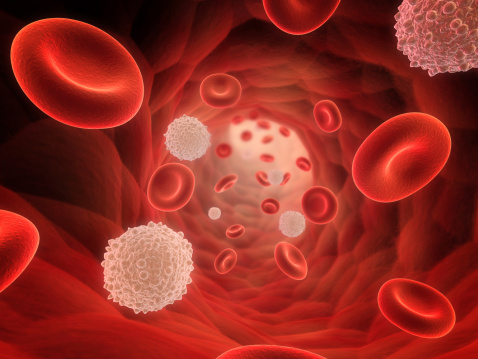(单词翻译:单击)
When a foreign material goes into the body's tissues, it will cause a change in the body's biological makeup.
外界物质进入人体组织中会使人体内的生物构造发生变化。
We regard this altered responses as immune responses.
我们把这种变化成为免疫反应。
The foreign material is called an antigen.
外界物质被称为抗原。
Once an antigen enters the body, it travels in the blood or lymph.
抗原进入体内后会随着血液和淋巴液在体内循环。
It will start 2 responses.
这会使机体发生两种反应。
The cell-mediated responses increases the number of the lymphocytes (white blood cells).
细胞免疫反应会产生更多的淋巴细胞(白细胞)。
The lymphocytes react specifically with antigens.
白细胞专门用来分化抗原。

Second, if lymphocytes are stimulated, they will cause the humoral immune response.
第二,如果淋巴细胞受到刺激会造成体液免疫反应。
The response result in the synthesis of immunoglobulins or antibodies.
该反应会使体内同时产生免疫球蛋白和抗体。
They act to destroy antigens.
它们共同消灭抗原。
When an antigen of a type enters the body, and the body happens to have been exposed to it.
当一种抗体进入人体,而人体碰巧曾经收到过该抗原的入侵。
Memory lymphocytes will cause antibodies to form rapidly to attack the antigen.
记忆性淋巴细胞会迅速产生抗体抵抗抗原。
Immunoglobulin levels will also remain high.
免疫球蛋白的含量也会升高。
The formation of immunoglobulins or antibodies is the basis of immunization against disease.
免疫球蛋白和抗体的形成是疾病免疫的基础。
The antibodies most commonly found in the blood are the immunoglobulin G, IgG class.
人体血液中常见的抗体是G类免疫球蛋白。
They are important in resisting infection and can cross the placenta from mother to child, giving the infant passive immunity.
它们在抵御感染中起到了很重要的作用,还能经过胎盘从母亲体内传送给婴儿形成被动免疫。
Of course, the mere presence of a pathogen does not mean that an infection will begin.
当然,仅仅有抗原并不意味着会有感染发生。
An infection occurs in a cyclical process.
感染的发生是一个循环的过程。
The process depends on several elements. An infection will develop if this process is uninterrupted.
这个过程有赖于几个因素。如果这个过程未收到干扰,才会形成感染。
The nurse's efforts to control infection are directed towards breaking the infection chain.
护士控制感染的方法就是通过打破感染链。
译文属可可原创,仅供学习和交流使用,未经允许不得转载


